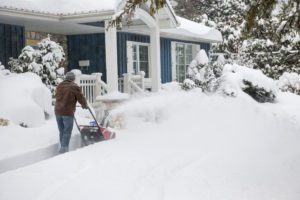How to Manage Snow Removal for Seniors

This winter we’ve seen more snowfall here in New England than we have over the last few years. For school-age children, skiers, and snow lovers, this is good news – but for the rest of us, snowstorms can tend to produce more hassles than fun. While snow shoveling isn’t enjoyable, it’s often unavoidable – and for seniors and individuals with disabilities who can’t clear the snow for themselves, it can become a downright dangerous or difficult situation.
Those who are housebound have an added challenge: they may need to have their sidewalks and driveways cleared early in the day to provide safe access for others to get in (such as nursing assistance, caregivers, or homebound meal delivery), or they may need to be able to leave their home early to be taken to a medical appointment. In some towns, homeowners also face fines if they don’t clear the sidewalks in front of their homes soon after the snow is done falling.
In most cases, seniors or their families can simply contract with a plowing company in advance to clear their outdoor areas after each storm. As long as they remain paying customers (and, in some cases, call or text their plowing company the night before a storm to ensure they’re still on the list for the morning), they will generally have their snow needs met for the season. If they have time-sensitive issues, such as the need to get out for doctor’s appointments early in the morning, or regularly scheduled visits from a caregiver, they should be sure to let the plowing company know that when they contract at the beginning of the season – and to also remind them when they get in touch the night before a predicted snowstorm.
However, in certain circumstances, even if they’ve contracted with a company ahead of time, elderly people may find themselves left high and dry if their plowing company is unable to come for a day or two. This was the case for many during the late-January blizzard we had this year. Plowing companies found themselves overwhelmed with the amount of snow and the number of customers who were asking for assistance, so in some instances they were unable to get out to housebound customers for a couple of days. In other cases, some seniors found that their plowing companies never came out to help them at all, or told them last-minute that they would need to find someone else this time. As a result, they were trapped in their homes for days.
If this has unfortunately happened to you, a family member, or someone for whom you are a caregiver, here are a few tips to keep in mind for next time:
1. Be sure to find a reliable plowing service early in the season. Waiting until just before a blizzard to ask to be added to someone’s plowing list is a sure recipe for disaster. In the heart of winter, plow services are usually busy and overbooked, so postponing your search until the last minute is a risky strategy.
2. Have a backup plan in mind. If you find out last-minute that your usual plowing company can’t service you this time, or if your plowing guy is a no-show, make sure you know of other local plowing companies that you could call. (You may want to reach out to them ahead of time to be sure they would have availability to fit you in at short notice.)
3. Look for a company that will do all of the following: plow your driveway, shovel your stairs and walkways, and use organic sands and salts to ensure that your driveway and walkways are as safe as possible.
4. Make sure that you’ve thought ahead and planned out your property to simplify the process of shoveling and dumping snow. Think about where you want excess snow to be placed in your yard, and what areas are priorities. Be sure to have essentials like firewood and your grill located close to your home to minimize the shoveling burden.
5. Look into other options besides professional plowing companies. If your senior lives in a neighborhood and is snowed in, chances are that a kind neighbor who hears about his or her plight will lend a hand with shoveling or snow-blowing him or her out. If local family members live nearby, they could come over to shovel after they finish clearing snow at their own home (and once the roads are cleared, of course).
6. Find out if your town or city coordinates shoveling services for the housebound and disabled. Many do, whether volunteer or paid. The way it generally works is that a call goes out to area businesses, residents, and even sports teams to find out who wants to be part of a compiled list of those willing to assist residents in need. Seniors who have called to ask for help are then connected with the individuals or organizations who respond, often based on addresses that are most convenient for them to visit. Generally, the respondents contact the homeowners directly to coordinate. If they plan to charge for their services, the seniors can negotiate a price. Others may wish to volunteer their services, which is a wonderful opportunity for community members to get to meet other people in their neighborhoods. Any work performed by sports teams is usually considered community service.
Although it can be a headache to plan for and manage snowfall, the good news is that we’ll be turning our clocks ahead again next month, so we’ll gain an extra hour of sunlight. Spring itself won’t be too far behind!
